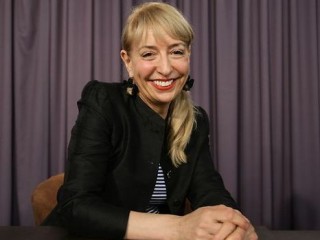
Susan Greenfield biography
Date of birth : 1950-10-01
Date of death : -
Birthplace : London,England
Nationality : English
Category : Science and Technology
Last modified : 2011-12-20
Credited as : scientist, Parkinson and Alzheimer researches, member of the House of Lords
3 votes so far
Greenfield is Professor of Synaptic Pharmacology at Lincoln College, Oxford. On 1 February 2006, she was installed as Chancellor of Heriot-Watt University in Edinburgh. Until 8 January 2010, she was director of the Royal Institution of Great Britain.
Greenfield's research is focused on brain physiology, particularly the etiology of Parkinson's and Alzheimer's diseases, but she is best known as a populariser of science. Greenfield has written several popular-science books about the brain and consciousness, and regularly gives public lectures, and appears on radio and television.
In 1994, she was invited to be the first woman to give the Royal Institution Christmas Lecture, then sponsored by the BBC. Her lecture was titled "Journey to the centre of the brain". She was appointed Director of the Royal Institution in 1998, until the position was scrapped as being "no longer affordable" in 2010. Greenfield was Adelaide's Thinker in Residence for 2004 and 2005. From 1995 to 1999, she gave public lectures as Gresham Professor of Physic.
Greenfield created three research and biotechnology companies: Synaptica, BrainBoost, and Neurodiagnostics, which research neuronal diseases such as Alzheimer's disease. She is a Patron of Dignity in Dying and a founder and trustee of the charity Science for Humanity, a network of scientists, researchers and technologists that collaborates with non-profits to create practical solutions to the everyday problems of developing communities. The idea of matching scientific capability with the needs of poor communities came to her while writing Tomorrow's People, a book in which she imagined a future world of "techno haves and techno have-nots". She felt that the democratization and dissemination of science through organizations like Science for Humanity was a way to avoid such a future.
Baroness Greenfield sits in the United Kingdom Parliament in the House of Lords as a crossbencher, having no formal political affiliation. Records of Baroness Greenfield's activity in the House of Lords indicate abstention on a range of issues.
Greenfield has expressed concerns that modern technology, and in particular social networking sites, may have a negative impact on child development. In an August 2011 interview with New Scientist, Greenfield cited a June 2011 study published in PLoS ONE as evidence for her claims. In the study, the authors investigated changes in the microstructures of major fiber pathways in the brain of 18 adolescents.
Gray matter atrophy and fractional anisotropy to some white matter portions of the brain were found to have a significant correlation with the duration of internet addiction disorder (IAD). The authors noted similarities between the structural changes from IAD and those from substance abuse studies, suggesting that the mechanism for both may be similar. The authors concluded that the structural changes they found "probably contributed to chronic dysfunction in subjects with IAD."
In this respect, she has been criticised by Dr Ben Goldacre for claiming that technology has adverse effects on the human brain, without having undertaken any research or properly evaluating available evidence. Goldacre called on her to "[formally] write up her concerns about computers damaging children's brains", to which she replied that he is "like the people who denied that smoking caused cancer". More recently Dr Goldacre replied that "A scientist with enduring concerns about a serious widespread risk would normally set out their concerns clearly, to other scientists, in a scientific paper"
As well as having 30 honorary degrees, Greenfield has been awarded the Royal Society's Michael Faraday Prize, and in January 2000, received the CBE for her contribution to the public understanding of science. Dimbleby Lecturer 1999. Hon Australian of the Year 2006. She is a Patron of the Alzheimer's Research Trust. In 2003, she was appointed a Chevalier Légion d'Honneur by the French Government, and in June 2001, she was created a Life Peer, as Baroness Greenfield, of Ot Moor in the County of Oxfordshire.
Author of books:
-Mindwaves: Thoughts on Intelligence, Identity, and Consciousness (1987, with Colin Blakemore)
-Journey to the Centers of the Mind: Toward a Science of Consciousness (1995)
-The Human Brain: A Guided Tour (1997)
-How We Work: Understanding the Human Body and Mind (1997, with Philip Whitfield)
-The Private Life of the Brain (2000)
-Brain Story (2000, TV series tie-in)
-Tomorrow's People (2003)
-Inside the Body (2006)
















